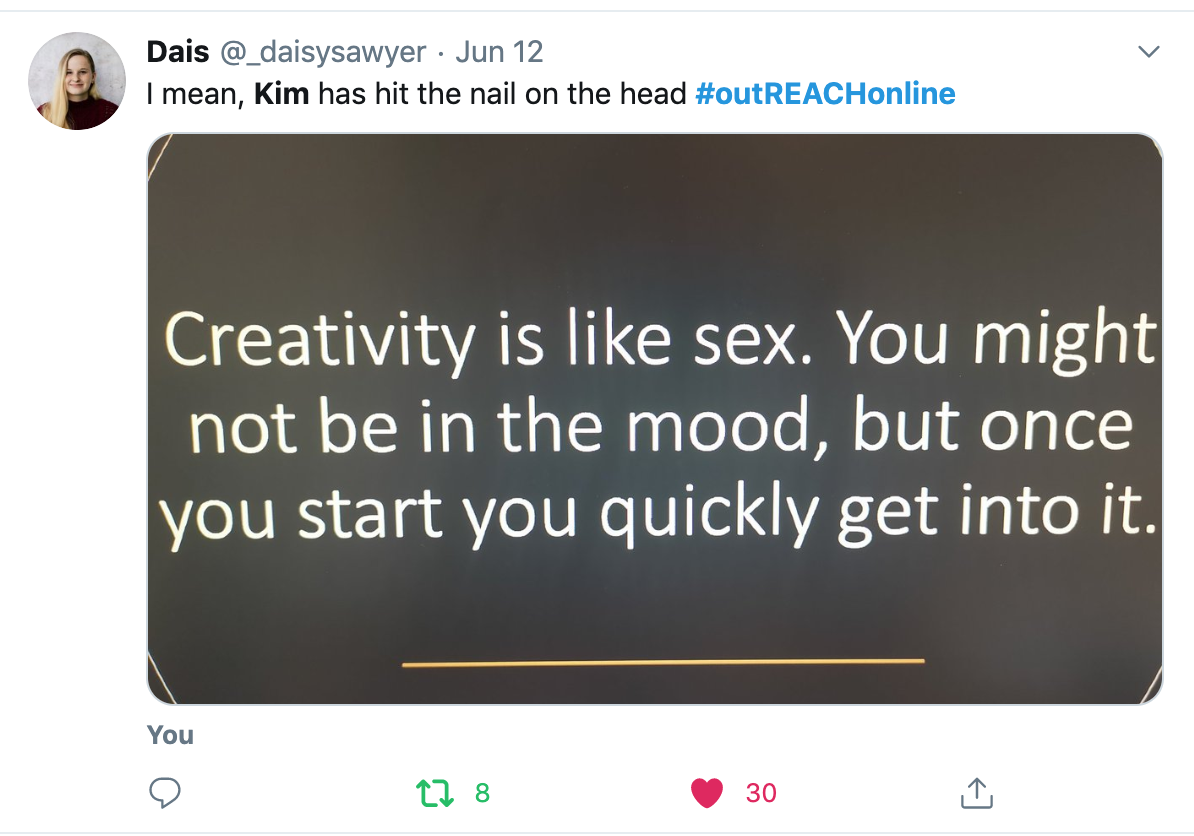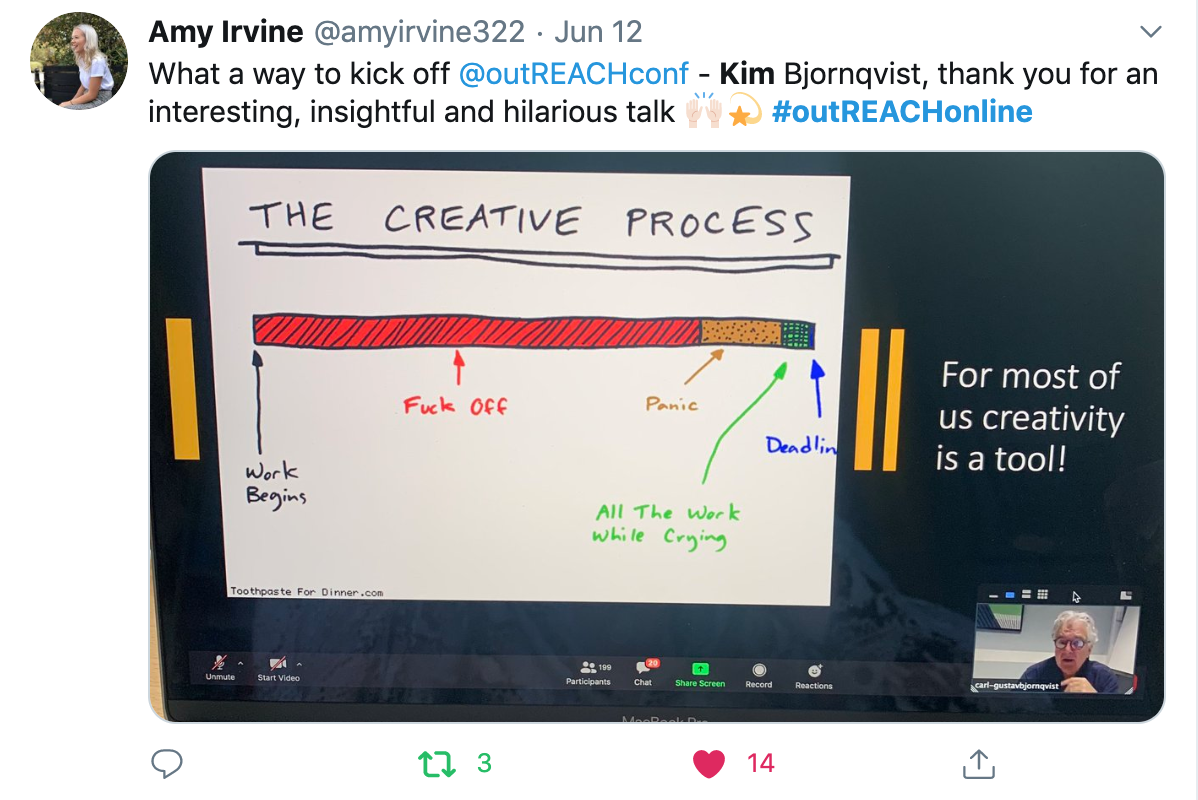Earlier this month we were unable to bring outREACH Conference to London due to Covid-19 restrictions, BUT, we didn’t let the pandemic hold us down! Instead we brought you outREACH Online Conference, which was even better than we could have imagined. We are so grateful to all our speakers who were able to join us for this slightly less conventional format – but it totally worked and judging by the feedback from participants, it is something we would definitely consider again for the future. If you were unable to join us for the day, you’ll be pleased to know we recorded all of the sessions, including talks from Rand Fishkin, Shannon McGuirk and Mark Johnstone. Take a look at them today!
The only problem we had was time! There wasn’t enough of it!! All of our speakers delivered rich and interesting talks, which were followed up with questions from the audience. And boy, did we get A LOT of questions. For that reason, we’ll be posting a series of follow-up blogs where our speakers have kindly taken the time to answer all the questions we were unable to get round to on 12th June, starting off with our first speaker of the day, the delightful, Kim Bjørnqvist.
Kim is the Associate Professor of Creativity and Communication at the School of Communication, Leadership and Marketing at Kristiania University College in Oslo. To say his talk set the bar high is an understatement as you can see from some of the tweets from the morning.
When we caught up with Kim after the conference he was keen to express his gratitude to the audience for their time, questions and kind feedback. His talk was distilled from what he would normally cover in the two day workshops he does on creativity, as well as the talks he gives on how to pitch ideas and creative writing/copywriting. It was quite the challenge for him to give a brief overview in such a short time on what is a quite complicated and fascinating subject – but he delivered nonetheless. If you are interested in finding more about this from the man himself he’d love to hear from you.
We asked Kim to answer a bunch of your questions from the conference, and here’s what he had to say…
Are there any books, podcasts, shows etc. on the creative process you would recommend?
Not as many as one would think. Unfortunately, most books about the subject of creativity fall into two categories; pretentious bullshit or self-promoting ‘look at me, how sensationally creative I am! Follow my rules, or go down the road to hell.’
Most of the books in the second category are written by advertising gurus. Good exceptions include; George Lois; Great Advice for Very Clever People and Hegarty on Creativity by John Hegarty. For the more academically inclined, there is always Mihaly Csikszentmihalyi (1990). Flow: The Psychology of Optimal Experience.
I also like Made to Stick by Chip and Dan Heath, a very hands on, refreshingly brash, typically American approach. There are some other good ones, but unfortunately they are in Norwegian.
For initial phases of pouring ideas in the bucket – do you go on until you are done or do you set a timer for adding a bit of creative pressure?
Definitely until you are done. You need a lot (100? 200?) crappy ideas to get to the really good ones. But remember to take 15 min breaks every 45 minutes. Leave the desk and take a walk, preferably outdoors.
I’m also a big fan of biometrics. Could you share any pioneers or resources on this topic?
You probably know more than me about this! My knowledge is limited to the very basic ideas. Here is an interesting link to a Norwegian company that is heavily into this.
Do you have any tips for running creativity/ideation sessions online as we have to do this a lot at the moment?
Not an easy subject – but, you need a leader/supervisor to run the process. Democracy is great in politics, not in an ideation process. Use breakout rooms as much as possible, 5 to 10 minute breakout sessions, before everyone gather together and present their stuff. The fact that zoom chooses breakout groups at random can be used to your advantage.
What do you do if you are not feeling creative?
Start creating something! Train yourself to start the process and force yourself to keep on, you will find that you quickly get into it. Like I said at the conference, creativity is a bit like sex in that respect!

What’s your favourite creative brainstorming activity?
Well, it’s not brainstorming! (In the sense of a group of people sitting around a table, discussing.) This favours the extroverts, and it is not always the extroverts that come up with the best ideas. My favourite is the post-it method: 5 minutes intense jotting down of ideas in silence, before each in turn are put up on the wall, then grouped and finally go through the realist and critic stage.
What do you do if you know you have a decent idea, but can’t seem to get that spur of creativity to see it through or form it properly?
Polish it in a team. Working with other people often bring you the missing elements.
Who is the person or persons that has inspired you the most?
Frank Zappa, genius musician and weird/crazy person. Beethoven, for never compromising. Picasso, for his limitless creativity.
What’s the perfect number of people for a brainstorm? Is it better for more people or a handful?
My favourite number is five, if you have to be six, divide into to groups. I prefer uneven numbers, because you avoid two equal fronts stalling the process.
After some time, one may start to doubt his own creative ideas. Any advice on how to keep interest in them and not ditch them?
Never throw any ideas away. Keep an archive. Use the creative circle I gave you in my talk. Find out which segments need to be strengthened in order to get rid of the doubt.
Do you think that some people are just inherently more creative? And can you teach creativity?
Some people may have a slight advantage, due to genes, upbringing, schools etc, but creativity is like a muscle, it can definitely be trained. But you need the proper methods. Can you teach creativity? I certainly hope so, since I’ve been doing it for decades!
Do you have any tips on how to handle limitations in the creative process? Like budget, resources, time, special tone of voice etc.
Look at limitations as possibilities. In my opinion, creativity blossoms if you work within limits. Maybe not if you are an artist, but certainly in the creative industries.
Thanks again to Kim for his time during and after the conference. We’ll be bringing you more Q&A follow ups from our amazing all female panel which consisted of Carrie Rose, Gisele Navarro, Ruth Barrett and Verve Search’s very own Laura D’Amato, as well as from Mark Johnstone, Shannon McGuirk and more over the next few days.
And don’t forget you can still get tickets for outREACH London, which will now be held in November, but if you can’t wait until then, you can pick up the footage from the online conference here and find out more about what Kim means when he says creativity is like sex!








